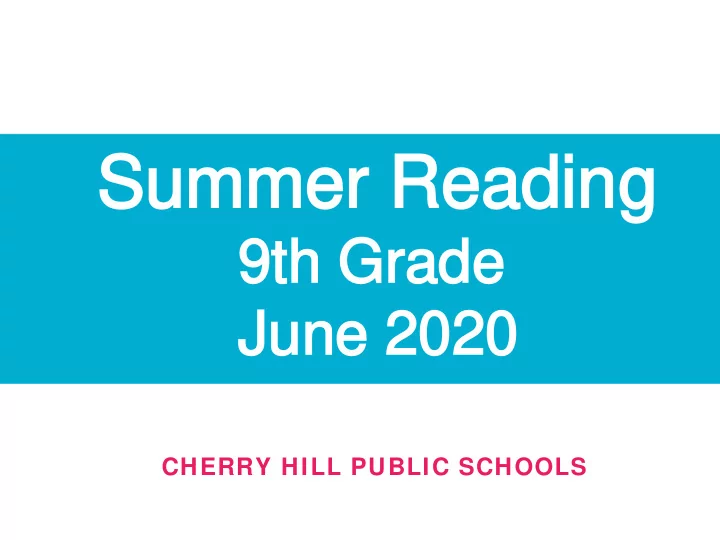

Summer Reading Summer Reading 9th Grade 9th Grade June 2020 June 2020 CHERRY HILL PUBLIC SCHOOLS
Summer Reading Assignmen Summer Reading Assignmen 1. The following summer reading books were selected to allow you to explore the thematic topic of Constructing Identities. 2. Read at least one of the books from the list and complete the assignment. Note: Honors students will select one of the four books as well as an additional required text. 1. When you return to school in September, you will be asked to analyze, summarize, discuss, and write about the text(s) you read.
Summer Reading Assignmen Summer Reading Assignmen Constructing Identities Guiding Questions ● How do we form and shape our identities? ● How does what others think about you affect how you think about yourself? ● What can you learn about yourself from studying the lives of others? ● In a culture where we are bombarded with other people trying to define us, how do we make decisions for ourselves?
Paulo Coelho's masterpiece The Alchemist The Alchemist tells the mystical story of by Paulo Coelho by Paulo Coelho Santiago, an Andalusian shepherd boy who yearns to travel in search of a worldly treasure. His quest will lead him to riches far different— and far more satisfying— than he ever imagined. Santiago's journey teaches us about the essential wisdom of listening to our hearts, of recognizing opportunity and learning to read the omens strewn along life's path, and, most importantly, to follow our dreams.
The Secret Life The Secret Life Set in South Carolina during 1964, The Secret Life of Bees of Bees of Bees tells the story of a fourteen year old white girl, Lily Owens, whose by Sue Monk Kidd by Sue Monk Kidd life has been shaped around the blurred memory of the afternoon her mother was killed. When Lily’s fierce-hearted “stand-in mother,” Rosaleen, insults three racists in town, they escape to Tiburon, South Carolina—a town that holds the secret to her mother’s past. Taken in by an eccentric trio of black beekeeping sisters, Lily finds refuge in their mesmerizing world of bees, honey. Lily starts a journey as much about her understanding of the world, as about the mystery surrounding her mother.
The Book Thief The Book Thief by Markus Zusak by Markus Zusak It is 1939 in Nazi Germany. Liesel Meminger is a foster girl living outside of Munich, who scratches out a meager existence for herself by stealing when she encounters something she can’t resist–books. With the help of her accordion-playing foster father, she learns to read and shares her stolen books with her neighbors during bombing raids as well as with the Jewish man hidden in her basement.
The Curious Incident The Curious Incident of the Dog in the of the Dog in the Christopher Boone knows Nighttime Nighttime every country and capital, and every prime number up by Mark Haddon by Mark Haddon to 7,057. Although gifted with a superbly logical brain, Christopher is autistic. His carefully constructed world falls apart when he finds his neighbor’s dog impaled on a garden fork, and he is blamed for the killing. Christopher’s investigation to find the killer leads him down some unexpected paths.
Jane Eyre Jane Eyre by Charlotte by Charlotte Chapters 1-27 Bronte Bronte A novel of intense power and intrigue, Jane Eyre has dazzled generations of readers with its depiction of a woman's quest for freedom. Having grown up an orphan in the home of her cruel aunt and at a harsh charity school, Jane Eyre becomes an independent and spirited survivor-qualities that serve her well as governess at Thornfield Hall. But when she finds love with her employer, Rochester, the discovery of his terrible secret forces her to make a choice. Required for Honors Level
Summer Reading Assignmen Summer Reading Assignmen You may choose how you format your notes, but your notes must fulfill the following requirements: ● There is no minimum page requirement. However, notes must cover the entire length of the text. Be sure to include notes from the beginning, middle and end of the text. ● Notes must include textual evidence (include page number) and your thoughts, analysis, interpretation, and/or questions. ● Notes may be typed or handwritten. If you choose to type the notes, you must have a printed copy to use in class by the second day of school.
Summer Reading Assignmen Summer Reading Assignmen Scoring Rubric Score 4 2 0 Points Descrip- Notes are Notes are Student did not tion thorough and somewhat complete or reflective, and thorough and submit notes. appear to cover reflective, and the full length of appear to cover the text. some of the text.
Option 1: Option 1: Dialectical Journal (Two Column Notes) Dialectical Journal (Two Column Notes) Using a two-column format, engage in a written dialogue with the text as you read. In the left-hand column, write the important text. In the right-hand column, respond to the text. This is where you can include reflections, analysis and explanations of how the text connects to the thematic questions.
Option 2: Option 2: - Text Annotations Text Annotations For in-text annotations, you will need to have a physical copy of the book. Record your notes directly in the book or on post-it notes, reflecting how the text connects to the guiding questions. You will need to bring the book and their notes in September.
Option 3: Option 3: Outline Outline Create a structured outline focused on the theme and supported with textual evidence. You can choose how to organize your outline. It may be helpful to organize it based on the plot or by guiding questions.
Option 4: Option 4: Mind Mapping Mind Mapping Create a visual representation of text, important characters or plot episodes that connect to the guiding questions. Use lines, arrows, bubbles and/or sketches to link notes back to the questions.
Additional Resources Additional Resources Teachingbooks.net Username: chclc Password: books Resources for Note Taking www.chclc.org select the Academics tab
Recommend
More recommend